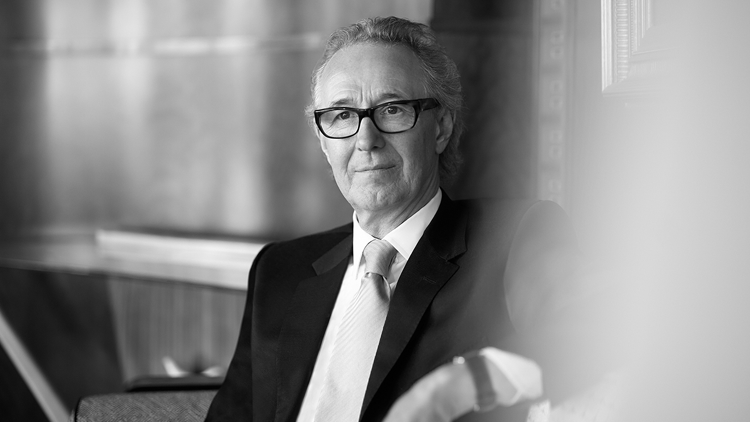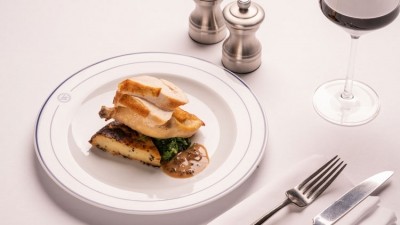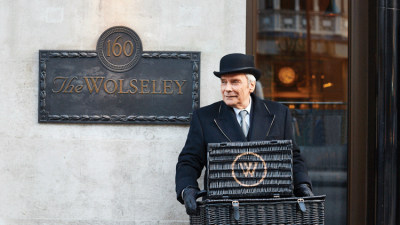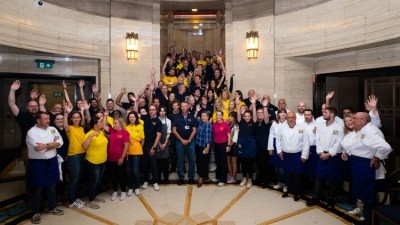Chris Corbin: “We had the best of it”

So, who exactly is cooking dinner at this year’s event?
Confirmed so far this year are Simon Rogan, Brett Graham, Isaac McHale, Mark Hix, Chantelle Nicholson, José Pizarro and Chris and Jeff Galvin. As is tradition, we will also reveal a few more surprise chefs on the night to keep people on their toes. The event will take place at The Dorchester on 10 October having been rescheduled due to the death of the Queen.
What’s the format of the event?
Around 20 chefs each cook for a table of 10, so we serve about 200 people in total. That is of course a lot of chefs but the model works because they are only cooking for 10 people each. It’s therefore not a big deal in terms of their time or resources. We also ask a dozen or so of the chefs to let us auction them off to cook a meal at someone’s house. That’s where the majority of the cash we raise comes from.
Who’s Cooking Dinner? has been going for some time...
Yes. Peter Gordon (the high-profile New Zealand-born chef) and I launched Who’s Cooking Dinner? in 1998 to raise money for leukaemia research. It all happened by chance. I was being treated for leukaemia at Hammersmith Hospital. One of the team there was an avid home cook and had bought Peter Gordon’s book The Sugar Club. It had an email address in it for anybody having problems with the recipes. She emailed him from the haematology department with a question, and he emailed back to say that he’d recently donated bone marrow to his sister in New Zealand, who had leukaemia. She immediately said ‘brilliant, how can you help us?’. Peter suggested the format and I was called in to help because of the connection with the hospital.
Is it easy to find people to do it after all these years?
Yes. We have some chefs who have done it almost every year including the likes of Mark Hix and Giorgio Locatelli. We’ve grown old together - there’s a nice camaraderie. People enjoy it so much they even ask me when the next date is so they can plan ahead. Doing it at The Dorchester has made a big difference because the kitchens are so state of the art - it makes the logistics easier.
You’re partnering with Hospitality Action this year. Why?
It was a natural thing. We missed last year of course because of lockdown. Somebody suggested something along the lines of ‘look, the hospitality industry has had such a battering let’s try and do something that would help the industry’. We are going to split the funds raised with Hospitality Action and Leukaemia UK, of which I’m the chairman.
Why is it important to put money into funding leukaemia research?
We simply haven’t made enough progress. The issue with leukaemia is that there are 20 types. Because of that the support can be a bit disparate. While we are focused on research at Leukaemia UK, we are working to bring other charities together. Leukaemia is devastating in terms of the effects that it has on people’s lives. And, like all cancers, it does not affect just the patient, it affects the whole family.
What is the research focused on at the moment?
We’re looking for kinder treatments. What I went through when I was diagnosed with chronic myeloid leukaemia at the age of 38 was quite brutal. These days I would have probably been treated with a pill. Our charity supports young scientists with fellowships at various institutions. Earlier diagnosis is also important and ultimately, of course, we are looking for a cure.
You’ve been in the industry for some time. What are the key changes you have witnessed?
The diversity of places to eat. Good food can now be had a good price in lots of different places - not just the West End of London. Raising money has become easier. When Jeremy (Corbin’s business partner) and I started out in our 20s raising money was virtually impossible. There is now much more confidence in the sector in terms of people investing. But we were also very lucky to start out as a changing of the guard was taking place, with chefs such as Alastair Little, Simon Hopkinson and Jeremy Lee coming to the fore. Terence Conran was also working hard to professionalise restaurants. He brought in food and beverage people and marketing people. Those things just weren’t considered when we were starting out.
What’s your view on the takeover of Corbin & King by Minor International now the dust has settled a bit?
Although it was uncomfortable and unnecessary in all sorts of ways I don’t have any regrets. I think Jeremy [King] might feel a little bit more bitter about it because he was on the front line, I had stepped back. But that’s for him to say really. To be honest I feel we had the best of it. Creating something that hadn’t been done before was a real thrill. Prior to The Wolseley opening in 2003 you went to either The Ritz or Caffè Nero for breakfast. There was no middle ground. Other things spun from that of course - such as Brasserie Zédel, which was another big one for us - but it got to the point where the model was set and we were basically just running it. We had the best of it. I’m 70 now. I’m not sure how much longer I would have gone on walking the floor.




































